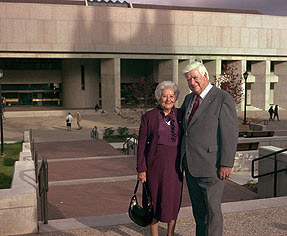
By
Boston College is marking the 100th birthday of the late Thomas P. “Tip” O’Neill Jr., a 1936 alumnus who rose from his modest North Cambridge neighborhood to become of one the most powerful figures in American politics, with a special course and exhibition.
This fall, O’Neill, a member of Congress for 34 years and the Speaker of the US House of Representatives from 1977 to 1986, is the subject of a course taught by Thomas P. O’Neill Jr. Professor of American Politics R. Shep Melnick. Later this month, an exhibition highlighting O’Neill’s life and career will go on display in O’Neill Library, which was dedicated in his honor in 1984.
This year also marks the 25th anniversary of the Honorable Thomas P. O’Neill Jr. ’36 LLD ’73 (Hon.) Scholarship Fund. Established through gifts in honor of O’Neill, the fund provides financial assistance to qualified students, with a preference for residents of the late congressman’s districts. Since the first scholarships were presented in 1987, some $4.2 million has been awarded to more than 300 students.
“Tip O’Neill had a profound impact on Boston College,” said Senior Vice President James P. McIntyre, chairman of the O’Neill Scholarship Committee. “He sponsored two dinners in Washington DC, one attended by President Jimmy Carter and another attended by President Ronald Reagan, that raised millions for financial aid and an endowed professorship. Because of his advocacy, Boston College enjoyed an enhanced profile in the highest of political and social circles. The O’Neill Library is a symbol of his loyalty and generosity to his alma mater.”
In conjunction with Melnick’s course, “Tip O’Neill and the Evolution of American Politics,” renowned congressional scholar Thomas E. Mann, the W. Averell Harriman Chair and senior fellow in Governance Studies at the Brookings Institution, will give a special lecture on Thursday, Oct. 18, in the O’Neill Library’s Reading Room at 4 p.m. A reception will follow, which will be attended by members of the O’Neill family as well as current and past O’Neill Scholarship recipients.
Melnick uses O’Neill’s political career as a window for examining two key changes in American politics: the shift from the relatively conservative, seniority-based congressional system of the 1950s and early 1960s to the significantly more liberal and entrepreneurial Congress of the late 1960s and early 1970s; and the shift from the bipartisanship that characterized the House and Senate from 1912 through the early 1980s to the era of intense partisan polarization seen in Congress today.
“Not only will an examination of his career help students understand the evolution of American politics from mid-century to the late 1980s, but they will be able to see how an astute political leader was able to adapt to changing times while remaining true to his basic commitments,” according to Melnick.
O'Neill died in 1994 at age 81.



